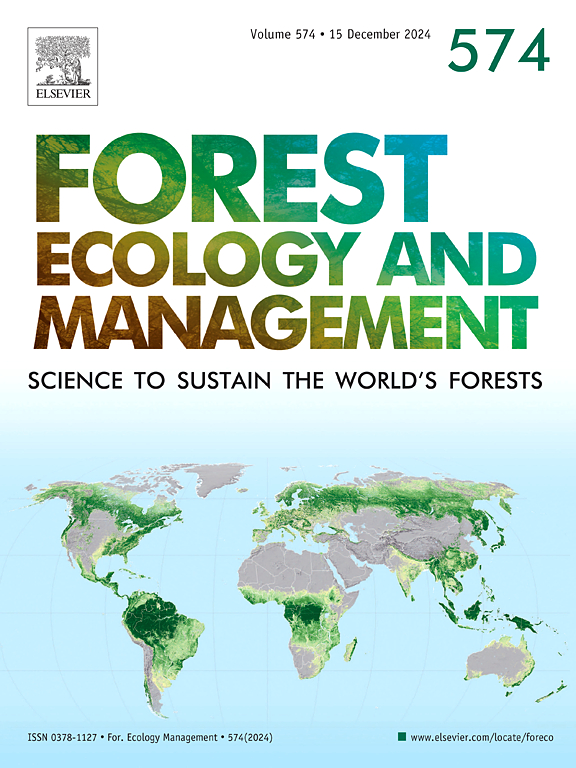野生蜜蜂群落对人工种植的龙柏林(Pinus taeda L.)森林除草剂处理的反应
IF 3.7
2区 农林科学
Q1 FORESTRY
引用次数: 0
摘要
生产性龙柏松(Pinus taeda L.)森林依靠除草剂来清除林下植物并提高森林生产力,但有关除草剂对野生蜜蜂的间接影响的研究却很有限。我们的研究目标是1)评估两年内除草剂处理对野生蜜蜂种群和群落的间接影响;2)确定林分属性(包括林下植物群落的变化)与野生蜜蜂反应之间的联系。2022-2023 年,我们在佐治亚州皮德蒙特地区对建园初期和中期的龙柏松林进行了采样。建植后的早期林分通过以下方式施用了广谱除草剂:1) 播撒化学制剂;2) 播撒化学制剂 + 带状草本杂草控制;或 3) 不使用除草剂的控制。轮伐中期的林分采用以下方法之一:或 2) 不使用除草剂的对照组。我们用平底锅和蓝色叶片诱捕器对蜜蜂进行采样,并记录林分属性,如树冠开阔度、草本植物物种丰富度、裸地覆盖率、枯落物和倒伏的木质碎屑。我们捕获了 111 个物种的 7969 只蜜蜂,占佐治亚州发现的所有蜜蜂物种的 20%。经除草剂处理过的林分中野生蜜蜂群落的总捕获量、物种丰富度和功能多样性与未经处理的对照组相似或更高。裸地覆盖是植被重建后早期林分中蜜蜂物种组成的一个重要驱动因素,指示物种分析确定了与植被重建后早期处理相关的六个土壤筑巢物种。中期旋转对照林分以林下植被为主,而播撒木质释放处理则与更多的钉耙、粗木屑和裸露地面覆盖物有关。蜜蜂捕获量对中轮伐林的树木密度增加有轻微的负面影响。我们的总体结果表明,广谱森林除草剂的应用对人工种植的龙柏松林中野生蜜蜂的负面影响极小。此外,除草剂处理可能会清除林下植物覆盖物,并通过增加裸露土壤来改善筑巢栖息地条件,从而使一些地巢蜜蜂物种受益。本文章由计算机程序翻译,如有差异,请以英文原文为准。
Wild bee community responses to forest herbicide treatments in planted loblolly pine (Pinus taeda L.) stands
Production loblolly pine (Pinus taeda L.) forests rely on herbicides to remove understory plants and promote forest productivity, yet there has been limited research on the indirect effects of herbicides on wild bees. The objectives of our study were to: 1) evaluate the indirect effects of herbicide treatments on wild bee populations and communities over a two-year period; and 2) determine linkages between stand attributes, including changes in understory plant communities, and wild bee responses. In 2022–2023, we sampled early post-establishment and midrotation loblolly pine stands in the Piedmont region of Georgia. Early post-establishment stands underwent broad-spectrum herbicide application through either: 1) broadcast chemical site preparation; 2) broadcast chemical site preparation + banded herbaceous weed control; or 3) control with no herbicide. Midrotation stands received either: 1) broadcast woody release treatment; or 2) control with no herbicide. We sampled bees with pan and blue vane traps and recorded stand attributes such as canopy openness, herbaceous plant species richness, and cover of bare ground, litter, and downed woody debris. We captured 7969 bees from 111 species, which constitutes ∼20 % of all bee species found in Georgia. Wild bee communities in herbicide treated stands had similar or greater total captures, species richness, and functional diversity as those in untreated controls. Bare ground cover was a significant driver of bee species composition in early post-establishment stands and indicator species analyses identified six soil-nesting species associated with early post-establishment treatments. Midrotation control stands were dominated by understory vegetation, while broadcast woody release treatments were associated with greater snags, coarse woody debris, and bare ground cover. Bee captures exhibited a slight negative response to increased tree density in midrotation stands. Our overall results indicated minimal negative impacts of broad-spectrum forest herbicide applications on wild bees in planted loblolly pine stands. Further, herbicide treatments may benefit some ground-nesting bee species by removing understory plant cover and improving nesting habitat conditions through increases in bare soil exposure.
求助全文
通过发布文献求助,成功后即可免费获取论文全文。
去求助
来源期刊

Forest Ecology and Management
农林科学-林学
CiteScore
7.50
自引率
10.80%
发文量
665
审稿时长
39 days
期刊介绍:
Forest Ecology and Management publishes scientific articles linking forest ecology with forest management, focusing on the application of biological, ecological and social knowledge to the management and conservation of plantations and natural forests. The scope of the journal includes all forest ecosystems of the world.
A peer-review process ensures the quality and international interest of the manuscripts accepted for publication. The journal encourages communication between scientists in disparate fields who share a common interest in ecology and forest management, bridging the gap between research workers and forest managers.
We encourage submission of papers that will have the strongest interest and value to the Journal''s international readership. Some key features of papers with strong interest include:
1. Clear connections between the ecology and management of forests;
2. Novel ideas or approaches to important challenges in forest ecology and management;
3. Studies that address a population of interest beyond the scale of single research sites, Three key points in the design of forest experiments, Forest Ecology and Management 255 (2008) 2022-2023);
4. Review Articles on timely, important topics. Authors are welcome to contact one of the editors to discuss the suitability of a potential review manuscript.
The Journal encourages proposals for special issues examining important areas of forest ecology and management. Potential guest editors should contact any of the Editors to begin discussions about topics, potential papers, and other details.
 求助内容:
求助内容: 应助结果提醒方式:
应助结果提醒方式:


